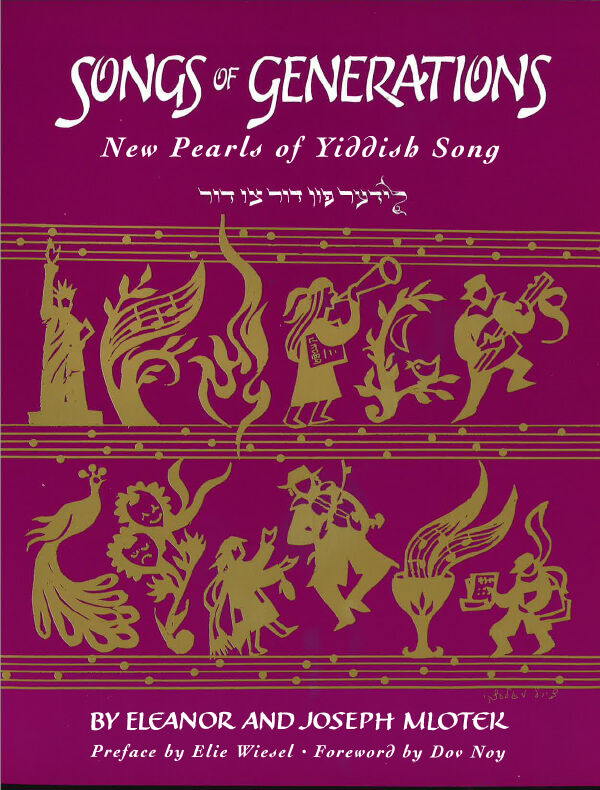Folksong of the exchange of impossible tasks. A fragment was published by S. Ginzburg and P. Marek in 1901; music and text were published by Y. L. Cahan in 1912. In the versions of the song there are about four different endings: “lkh bin klug un du bist oykh nit narish (or: du keyn nar), / Un lomir beyde shvaygn” (I am clever and you aren’t foolish either (or you are not a fool), and let’s both be silent): in Y. L. Cahan, N. Prilutsky, II; “lkh bin a nar, un du a greserer / Lomir beyde shvaygn” (I’m a fool and you’re a bigger one, so let’s be silent): in Moishe Beregovski, 1962; “Bist dokh a kluge, un ikh keyn nar- / To lomir beyde blaybn” (You are smart, and I’m no fool, so let’s remain [together]): in Ruth Rubin, Treasury; “Zol zhe dikh der tayvl hoyln / Un ikh zol dir nisht kenen” (May the Devil take you and I not know you): in N. Prilutsky, II.
The song is one of the oldest international ballad themes. In Child 2, it appears as a contest in the ballad of an elfin knight, a demon who tries to seduce the maid and carry her off. By countering his tasks with those of equal difficulty she escapes his trap. This song is one of eleven included by compiler in her paper “International Motifs in the Yiddish Ballad.” One Yiddish version of Prilutsky has the impossible task of counting the tears that orphans weep. A Jewish motif is introduced when one of the tasks proposed is to count all the candles that burn on the holy Sabbath.

Catch me a bear from the forest
and teach him how to write.
Then, and only then,
I will remain yours.
I will catch a bear from the woods
and I will teach him to write,
so bear me seven children,
and remain a virgin.
I’ll bear you seven children
and remain a virgin.
Make me a cradle
without wood and without tools.
I’ll make you a cradle
without wood and without tools.
Sew me seven shirts
without needles and without silk thread.
I’ll sew you seven shirts
without needles and without silk thread.
Catch me all the fish in the ocean,
so not a single one remains.
I’ll catch you all the fish in the ocean
so not a single one remains.
Fry up seven little fish
and have them stay alive.
I’ll fry you seven little fish
and have them stay alive.
May me a ladder
that will reach to the sky.
I’ll make you a ladder
that will reach to the sky.
I’m a fool, and you’re a bigger one,
Let us both stop talking.
— Nem mir aroys a ber fun vald
Un lern im oys shraybn-
Oto dentsmol, un oto dentsmol,
Vel ikh dayne blaybn.
— lkh vel dir aroysnemen a ber fun vald,
Un ikh vel im oyslernen shraybn,
Hob zhe mir zibn kinder,
Un zolst a meydl blaybn.
— lkh vel dir hobn zibn kinder
Un a meydl blaybn,
Makh zhe mir a vigele
On holts un on getsaygn.
— lkh vel dir makhn a vigele
On holts un on getsaygn,
Ney zhe mir oys zibn hemder
On nodlen un on zaydn.
— lkh vel dir oysneyen zibn hemder
On nodlen un on zaydn,
Khap zhe mir oys ale fish fun yam,
S’zol keyn eyne nit blaybn.
— Kh’vel dir oyskhapn ale fish fun yam,
S’zol keyn eyne nit blaybn,
Pregl op zibn fishelekh,
Zey zoln lebedik blaybn.
— lkh vel dir oppreglen zibn fishelekh,
Zey zoln lebedik blaybn,
Makh zhe mir a leyterl,
S’zol tsum himl shtaygn.
— lkh vel dir makhn a leyterl
S’zol tsum himl shtaygn,
lkh bin a nar, un du a greserer,
Lomir beyde shvaygn.
— נעס מיר אַרױיס אַ בער פֿון װאַלד
און לערן אים אוֹיס שרײַבן-
אָטאָ דענצמאָלט און אָטאָ דענצמאָלט
װעל איך דײַנע בלײַבן.
— איך װעל דיך אַרױסנעמען אַ בער פֿון װאַלד,
און איך װעל אים אױסלערנען שרײַבן,
האָב זשע מיר זיבן קינדער,
און זאָלסט אַ מײדל בלײַבן.
— איך װועל דיר האָבן זיבן קינדער
און אַ מײדל בלײַבן,
מאַך זשע מיר אַ װיגעלע
אָן האָלצ און אָן געצײַגן.
— איך װעל דיר מאַכן אַ װיגעלע
אָן האָלצ און אָן געצײַגן,
נײ זשע מיר אױס זיבן העמדער
אָן נאָדלען און אֶן זײַדן.
— איך װעל דיר אױסנײען זיבן העמדער
אָן נאָדלען און אָן זײַדן,
כאָפּ זשע מיר אױס אַלע פֿיש פֿון ים,
סיזאָל קײן אײנע ניט בלײַבן.
— כיװעל דיר אױיסכאַפֿן אַלע פֿיש פֿון ים,
סיזאָל קײן אײנע ניט בלײַבן,
פּרעגל אֶפּ זיבן פֿישעלעך,
זײ זאָלן לעבעדיק בלײַבן.
— איך װעל דיר אָפּפּרעגלען זיבן פֿישעלעך,
זײ זאָלן לעבעדיק בלײַבן,
מאַך זשע מיר אַ לײטערל,
סיזאָל צום הימל שטײַגן.
— איך װועל דיר מאַכן אַ לײטערל
ס׳זאָל צום הומל שטײַגן,
איך בין אַ נאַר, און דו אַ גרעסערער,
לאָמיר בײדע שװײַגן.
Song Title: Nem Mir Aroys A Ber Fun Vald

The Songs of Generations: New Pearls of Yiddish Song anthology comprises songs that were either never printed before or appeared in rare and inaccessible publications — sometimes in different versions and without proper sources. Most of the songs in this book were submitted by readers of Chana and Yosl’s column “Perl fun der yidisher poezye” (Pearls of Yiddish Poetry) in the Yiddish newspaper Der Forverts (The Forward), initiated in October, 1970. Over 25 years, thousands of songs were collected in correspondence and on cassettes from readers throughout the world, and they represent a veritable national Yiddish song archive. Chana Mlotek, in her introduction, writes, “In the course of years the inquiries, contributions and enthusiasm of these readers have kept our own interest unflagging and have reinforced our dedication to this effort. And in recent years our participants have also been augmented by new readers from the former Soviet Russia, who receive our newspaper there or from newly-arrived immigrants in this country and Israel.”